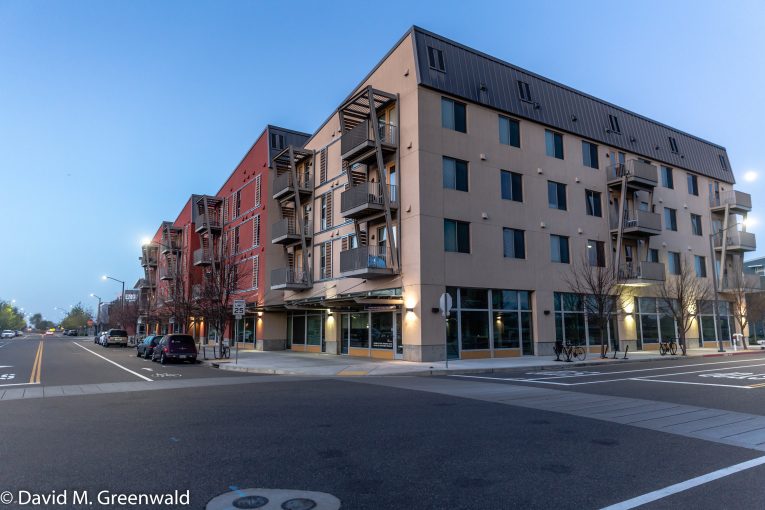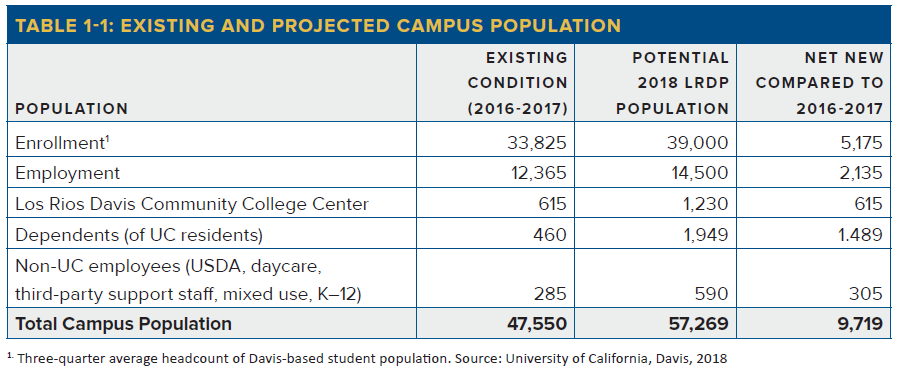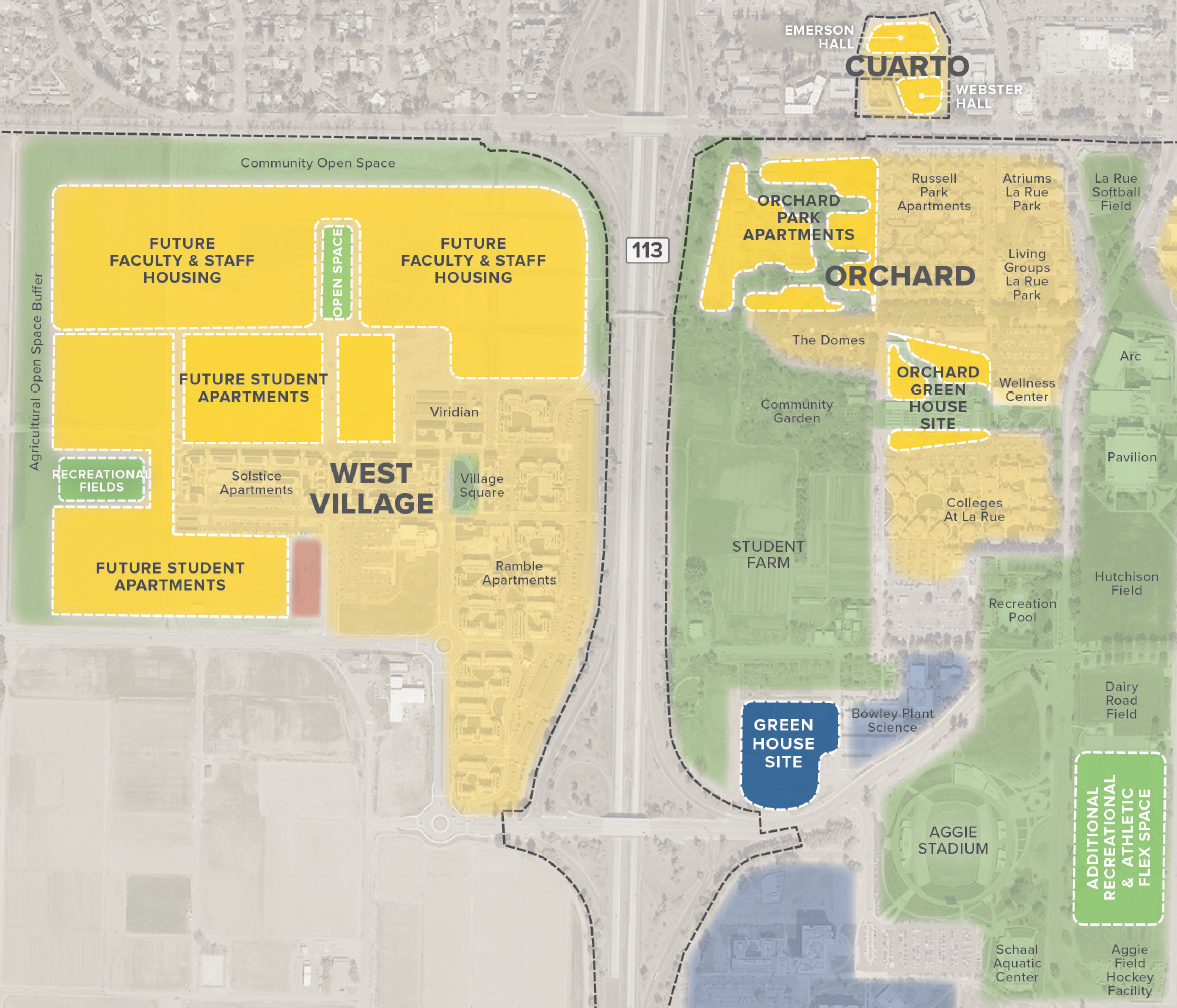

A long, three-year process nears its completion as the university has finalized both its 2018 LRDP (Long Range Development Plan) and Final EIR (Environmental Impact Report), focusing on the potential environmental impacts of implementing the 2018 LRDP and the potential project-specific environmental effects associated with two student-housing components of the 2018 LRDP: the West Village Expansion and the Orchard Park Redevelopment.
According to a release from the university, UC Davis will formally submit the 2018 LRDP and accompanying EIR for approval at the next meeting of the UC Regents, July 18 and 19, 2018.
The LRDP is “a comprehensive land use plan guided by principles and objectives that support the University’s mission while conserving resources and guiding the campus towards a more sustainable future.”
On the one hand, “the LRDP is a planning tool that establishes a land use framework for future campus growth to accommodate changes in enrollment, employment, physical infrastructure or facilities.”
On the other hand, “the LRDP is a planning guide that strives for the highest levels of stewardship for existing resources and for new investments in growth.”
For UC Davis, “the campus of tomorrow is a place where students, faculty, and staff live, learn and work in an environment that is beautiful and accessible, functional and flexible, and sustainable and resilient. It is a place that fosters research and innovation; it is a place that grows the most fertile minds for the next generation of engaged leaders; and it is a place that examines challenging societal issues.”
The UC Davis proposed 2018 Long Range Development Plan is “the culmination of a multi-year effort to understand these needs, identify strategic improvements and projects, and enable the campus of tomorrow.”
For most of the Davis community that has followed and engaged in this process, the focus has been on student housing. UC Davis, responding to its internal needs and community pressure, has expanded its planned allotment of student housing on campus.
The LRDP enrollment forecast is 39,000 students, which represents an increase of 5000. The LRDP also forecasts 14,500 employees, which is an increase of approximately 2000. While there has been a heavy focus on student housing over the course of the LRDP, not much has focused on the 2000 additional employees who will need housing.

On the other hand, the LRDP projects about 20,550 people living on campus, marking an increase of 10,550.
The LRDP notes: “Most of the potential growth in campus housing is oriented towards students – about 9,050 additional students living on campus. Most of the potential growth in student housing is oriented towards upper division undergraduates and graduates (non-freshman). The remaining potential growth in campus housing is oriented towards family housing for faculty, staff and students.”

The LRDP defines six residential neighborhoods associated with community life. It notes: “The Segundo, Tercero and Cuarto neighborhoods accommodate traditional first-year students in residence halls and offer programs to help students adjust to university life. The West Village, Orchard and Solano neighborhoods accommodate faculty, staff, undergraduate students, graduate students and students with families interested in living on campus.”
The residence halls will accommodate more than 5000 first-year students. These are located at Segundo, Tercero and Cuarto. The LRDP provides land for about 1,000 additional students in residence halls.
Meanwhile, campus apartments “are primarily located along the edge of campus and adjacent to the City of Davis.”
They write: “These neighborhoods include West Village, Orchard Park and Solano Gateway and are primarily oriented towards faculty, staff, undergraduate students, graduate students and students with families.”
Once again, West Village will encompass a large portion of the new student population: “The LRDP projection for West Village accommodates about 3,800 additional students in new construction and provides additional recreational open space as well as a community center. In 2016-17 the existing apartments accommodate about 2,000 students. The LRDP projection for West Village also includes about 500 residential units for faculty and staff.”

The Orchard Park plan currently contains five apartment complexes including Orchard Park Apartments, Russell Park Apartments, the Atriums at La Rue Park, the Social Living Groups at La Rue Park, the Colleges at La Rue and the Domes.
The LRDP provides land “for about 1,400 additional students in the redevelopment of existing Orchard Park Apartments. The project includes land for 200 two-bedroom apartments for students with families and apartment buildings for about 1,200 graduate students.”
The Solano Gateway includes Solano Park Apartments: “The LRDP provides land for housing about 1,000 additional students in the Solano Gateway neighborhood which contains two redevelopment areas. One redevelopment area contains Solano Park Apartments and Parking Lot 5. Redevelopment of the Solano Park apartments will not begin until new family-oriented student housing has been successfully implemented with the redevelopment of Orchard Park.”
In the EIR, the university notes: “Much like a city/county General Plan, the LRDP does not mandate growth or the provision of new facilities. Varying factors affect whether campus population levels may increase, decrease, or remain unchanged and the provision of new facilities may or may not occur with the increased population.”
The EIR, however, “assumes the forecasted student and faculty/staff growth would occur by the 2030-2031 academic year, along with development of related facilities and housing. The 2018 LRDP EIR will use the 2016-2017 academic year as the baseline year to reflect existing environmental conditions.”
—David M. Greenwald reporting


I think most of us are okay with 9000 new beds. Most of us however are worried that the beds will not be affordable – as they haven’t ben affordable in the past. Many of us are also worried that UCD has no intention of building 9000 new beds.
Reasonable concerns…
Reasonable near certainties ?
These are certainly reasonable and appropriate concerns, particularly when taking into consideration that UCD failed miserably to meet the on-campus student housing goals articulated in the November 2002 Board of Regents student housing report and the 2003 LRDP. Plus, UCD’s adoption of the “2020 Initiative,” with a goal of adding 5,000 more students over and above the number mandated by the Regents, violated one of the key tenets of the 1989 MOU with the City of Davis; i.e., to avoid sharp enrollment increases.
Another valid concern is UCD’s institutional inefficiency and ineffectiveness when it comes to new housing. Webster Hall is being replaced at great expense, but the new structure will add just one additional floor (going from 3 to 4 stories) with a minor net increase in the number of beds (even though UCD’s own website states that part of the rationale for the Webster replacement project is to accommodate a portion of the extra enrollment resulting from the “2020 Initiative).”
I’d like to see UCD assume the same proactive approach demonstrated by UC San Diego during the January 2017 Board of Regents meeting I attended. The campus planners told an enthusiastic Regents’ committee that the campus will replace outdated 2-story apartment structures with 8 and 15-story on-campus apartments. When questioned by the committee chair “why not higher,” UCSD responded that their only restriction is the flight pattern at Miramar Naval Air Station. Later during the same meeting, the UCSD Chancellor told the Regents that he is pushing to provide every UCSD student with a 4-year on-campus housing guarantee by the 2024-25 academic year.
Public proclamation by UCD of such a goal would be welcome not only by most Davis citizens, but also by the increasing number of current and future students forced to commute to campus from cities such as Woodland, Sacramento, West Sacramento and beyond.
” Later during the same meeting, the UCSD Chancellor told the Regents that he is pushing to provide every UCSD student with a 4-year on-campus housing guarantee by the 2024-25 academic year.”
I don’t think setting up an on-campus babysitting service is a healthy collegiate education paradigm. Going through staged independence, eventually living off campus is an important part of college.
I agree with this point. Most students I have spoken with believe a second year on campus is helpful especially given that they come to campus in September and have to look for housing four months later before many are really ready or familiar with the town. But most don’t want to live on campus all four years.